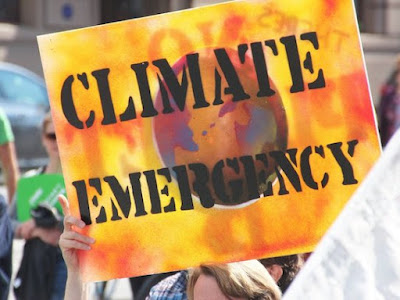Joseph Stiglitz | June 4, 2019 | The Guardian
Critics of the Green New Deal ask if we can afford it.
But we can’t afford not to: our civilization is at stake.
Advocates of the Green New Deal say there is great urgency in dealing with the climate crisis and highlight the scale and scope of what is required to combat it. They are right. They use the term “New Deal” to evoke the massive response by Franklin Delano Roosevelt and the United States government to the Great Depression. An even better analogy would be the country’s mobilization to fight World War II.
Critics ask, “Can we afford it?” and complain that Green New Deal proponents confound the fight to preserve the planet, to which all right-minded individuals should agree, with a more controversial agenda for societal transformation. On both accounts the critics are wrong.
Yes, we can afford it, with the right fiscal policies and collective will. But more importantly, we must afford it. The climate emergency is our third world war. Our lives and civilization as we know it are at stake, just as they were in the second world war.
When the US was attacked during the second world war no one asked, “Can we afford to fight the war?” It was an existential matter. We could not afford not to fight it. The same goes for the climate crisis. Here, we are already experiencing the direct costs of ignoring the issue – in recent years the country has lost almost 2% of GDP in weather-related disasters, which include floods, hurricanes, and forest fires. The cost to our health from climate-related diseases is just being tabulated, but it, too, will run into the tens of billions of dollars – not to mention the as-yet-uncounted number of lives lost. We will pay for climate breakdown one way or another, so it makes sense to spend money now to reduce emissions rather than wait until later to pay a lot more for the consequences – not just from weather but also from rising sea levels. It’s a cliche, but it’s true: an ounce of prevention is worth a pound of cure.
The war on the climate emergency, if correctly waged, would actually be good for the economy – just as the second world war set the stage for America’s golden economic era , with the fastest rate of growth in its history amidst shared prosperity. The Green New Deal would stimulate demand, ensuring that all available resources were used; and the transition to the green economy would likely usher in a new boom. Trump’s focus on the industries of the past, like coal, is strangling the much more sensible move to wind and solar power. More jobs by far will be created in renewable energy than will be lost in coal.
Read more at The Guardian
Joseph E Stiglitz is a university professor at Columbia, the 2001 recipient of the Nobel Memorial Prize in Economics, a former chairman of the Council of Economic Advisers, a former chief economist of the World Bank and the author, most recently, of People, Power, and Profits: Progressive Capitalism for an Age of Discontent
~ ~ ~









